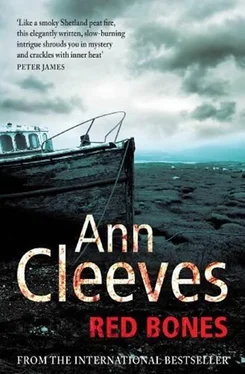Then he waited, looking out over the harbour, for his phone to ring again. After the deserted feeling of the day before, the place was back to normal. There were cars queuing for the ferry and a couple of fishermen were getting a small trawler ready to go out to sea. He supposed Jerry Wilson’s Norwegian friend had sailed a boat of a similar size to Norway.
His phone rang, interrupting daydreams of wartime adventures, grey seas and huge waves. He’d never been physically brave and he didn’t think he’d have had the courage to volunteer for the Shetland Bus.
‘I was so sorry to hear that Hattie’s dead,’ Mark said. ‘I remember her well.’
‘I wondered if she’d been in touch with you recently, but Mrs James said not.’
‘No. She might have contacted another professional though. Her GP should have records. Even when she was ill she was unusually self-aware. I think she’d have realized she needed help. If she was so desperate that she committed suicide.’
Perez picked up an uncertainty in his voice. ‘Were you surprised to hear she’d killed herself?’
‘I was. She was a very intelligent young woman. I thought she’d taken on board the strategies for coping with her depression. And she understood that medication would help her. She never refused to take it. Was there an event that distressed her, something very serious that provoked the suicide attempt?’
‘Not that we know.’ Perez paused. ‘We’ve not ruled out the possibility of other causes of death. I’m looking into the matter for the Procurator Fiscal. I’m grateful that you’ve taken the time to talk to me.’
‘I thought you should know that four years ago Hattie was a victim of a criminal assault,’ Evans said. ‘It might not be relevant, but it seemed important to tell you.’
‘We have no record of that.’ As he spoke Perez hoped that was true. They had checked Hattie’s name against the criminal records. That was standard procedure but if she’d been a victim would that fact have come to light?
‘She never reported the matter to the police,’ Evans said.
‘Why not?’
‘A number of reasons. She’d suffered a severe bout of depression a couple of years earlier. There had been occasions of psychosis. She didn’t think she’d be believed. Perhaps she even felt she was responsible. She wouldn’t even talk to her mother about it.’
In his quiet, reassuring voice Evans described the incident, as he understood it had taken place. He was clearly angry. When he’d finished, Perez could understand why.
‘You realize there’s no proof,’ he said. ‘They might not have got a prosecution even then.’
‘I do realize that,’ Evans said. ‘I probably shouldn’t have told you. It’s very unprofessional. I couldn’t discuss it with Mrs James. I just wanted you to know. After all, Hattie’s not here to tell you herself.’
Sandy woke early. He was lying in Mima’s high double bed. His mother had given him clean sheets to put on it, but the blankets had belonged to Mima. They smelled of peatsmoke and damp like the rest of the house. The sheet was wrinkled uncomfortably underneath him. He’d never quite got the hang of making beds the old-fashioned way. He liked fitted sheets and a duvet.
On the wall in front of him there was a photograph he hadn’t noticed before. Two women walking down a dirt track. It was taken on Whalsay but before any of the roads had been made up. On their backs they had the rush baskets or kishies that were used for carrying peat and they were so full that he could see the peat piled behind their shoulders. They were wearing old-fashioned bonnets and skirts below their knees, heavy boots. And as they walked they were knitting; the wool was held in apron pockets, their elbows were close to their bodies. They smiled towards the camera, poised for a moment, but you could tell the needles would begin clacking again as soon as the shot was over. Sandy wondered if they were knitting just for the fun of it, or because raising peat was boring, or because they were so busy that this was the only time there was in the day to provide clothes for their children. Or if they did it to make money. It was the sort of thing his mother might do, Sandy thought. Not exactly like the women in the old photo, but working at several things at once, because Evelyn liked to be active and because she needed to hold the family together.
He lay for quite a long time staring at the photograph. He didn’t think either of the women was Mima. She’d been much better-looking than they were and she’d never been a knitter. ‘I don’t have the patience for it,’ she’d said when he’d asked as a child why she didn’t knit like the other grandmothers. Then he thought about his father who’d gone to school in dirty clothes because Mima didn’t have the patience for washing either. Sandy didn’t think now he’d have preferred Mima as his mother; at least Evelyn had always fed them well and kept them clean.
Michael and his family were going south on the afternoon plane. Evelyn and Joseph were travelling down to the airport in Sumburgh to see them off. Sandy thought that might give him a chance to go into Utra and have a look round the house without his parents asking questions. His uneasiness about what had been going on there had grown in the last few days. Michael’s words about their parents’ future had brought it into sharper focus. He thought that was what had made his father so tense too – a vague anxiety that things weren’t quite right.
In Mima’s kitchen he made himself coffee and dialled Perez’s mobile. He hadn’t seen the inspector at all the previous day and he felt disconnected from the case. He’d enjoyed being at the centre of things during the investigation, responsible for making things happen. The inspector’s number was busy. He took his coffee outside. He felt the stirrings of hunger. His mother would be cooking breakfast for the whole lot of them in Utra but he didn’t think he could face that: the bairn grizzling, Michael talking about how well he was doing at work, Amelia being saintly. He went back inside, found an old packet of Bourbon biscuits in the cupboard and tried Perez’s number again.
This time it was answered. ‘Sandy. How are things?’
‘Well enough.’ He had wanted to discuss his concerns about the situation at Utra with Perez, but now he couldn’t find the words to do it. Besides, this was probably something he should deal with on his own.
There was a brief pause before Perez spoke again.
‘Did Mima ever talk about the Shetland Bus?’
‘Not to me.’ Of course Sandy had heard the stories but the old folks’ reminiscences had never meant much to him. All that seemed so long ago that it was no longer relevant. They could have been telling tales about trows. He wondered why Perez was interested now.
‘Apparently your Uncle Andrew’s father helped build the little inshore boats that the Norwegian vessels carried across the North Sea.’
‘Aye, I did hear that.’
‘Would Andrew know anything about it, do you think?’
‘I should think he would. He was always interested in anything to do with the sea.’
‘Would he tell you what he knows?’
‘He might. Some days he talks better than others. He minds things that happened long ago better than stuff that went on yesterday.’
‘Would he still talk to you if I was there too?’
‘Aye, I think he would.’
‘We need to ask him if there’s a Norwegian man buried at Setter.’ Perez went on to explain why the question should be asked, but Sandy wasn’t much clearer about what that could have to do with Hattie and Mima dying. All the same he was glad he had something constructive to occupy his time this morning. It gave him an excuse to stay away from Utra until everyone there had left for Sumburgh; he wouldn’t have to put on a show that he was sorry Michael and Amelia were leaving so soon.
Читать дальше












